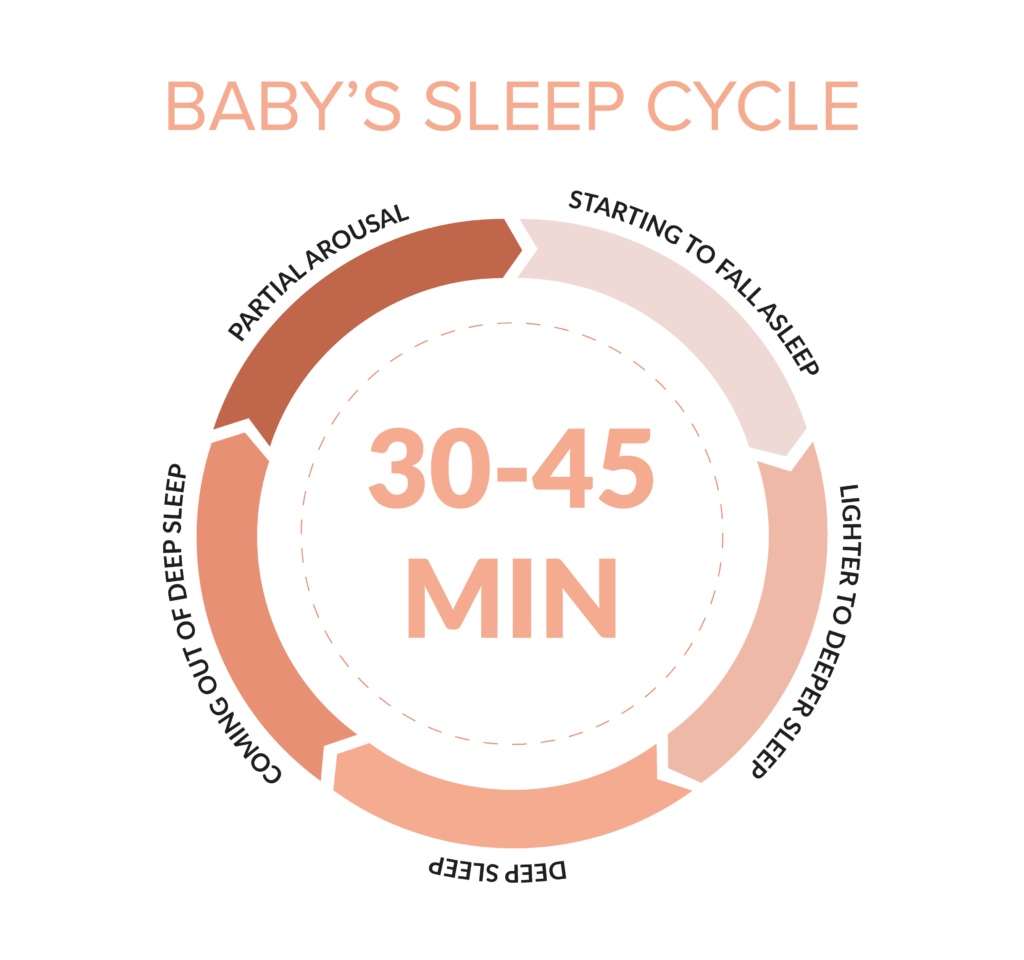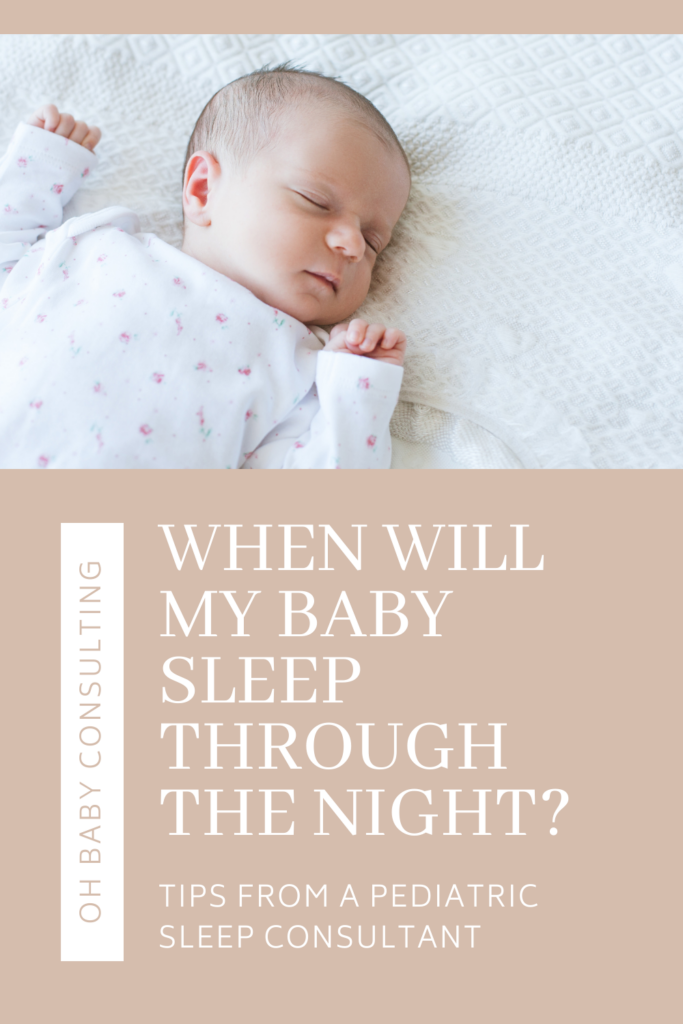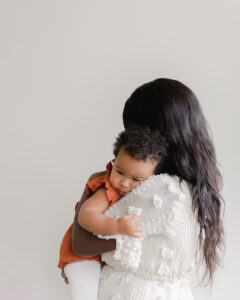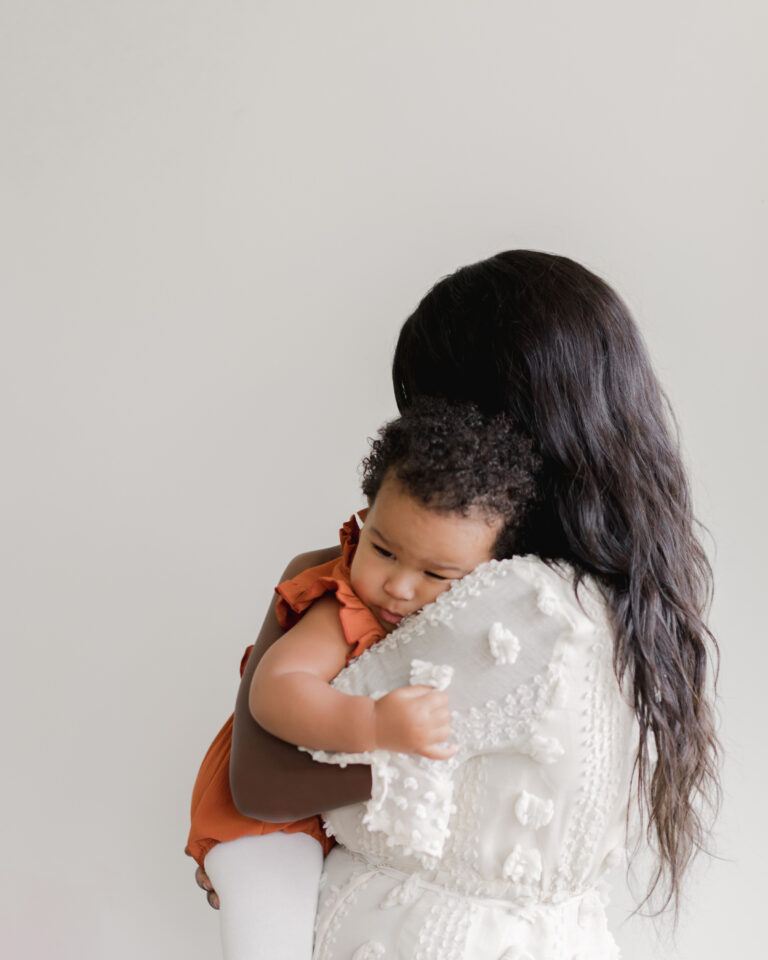Do you want to know the first thing I get asked when I tell people that I am a Pediatric Sleep Consultant? Probably no surprises here but they ask,
“When will my baby sleep through the night?”
And I get it! During infancy exhaustion is high and sleep is low. Sleeping through the night is like that coveted pot of gold at the end of the rainbow that so many parents are waiting to reach. But the answer to this age-old question is not super easy to generalize or pinpoint because there are a lot of factors to consider before narrowing down a timeline.
But if we’re being really real here, your baby will never truly sleep through the night.
I know that statement seems absurd and maybe a little unnerving, but it’s true! They won’t sleep through the night when they’re toddlers, or when they’re teenagers, or when they’re grown-ups, because nobody ever does.
But that doesn’t mean your dream of an 11-12-hour full night of interrupted sleep is shattered. In fact, once you understand exactly HOW we sleep, you are one step closer to this becoming your reality.
Baby sleep cycles
Infants over 4 months cycle through four stages of sleep, just like adults do:
Stage One is our lightest stage of sleep. This is a stage we are all familiar with. It is the time when we can feel ourselves drifting off but would still firmly insist that we weren’t really asleep. In babies, this looks like drowsiness.
Stage Two is the first “true” sleep stage in that we would admit to others that we have fallen asleep. Successful power-nappers usually do not go deeper than this stage, otherwise they will wake up groggy!
Stage Three is the deeper, more restorative part of the sleep cycle. It is that rich, delicious sleep that is needed for the body to repair cells, muscles, and energy stores. Spending significant time in this stage of sleep is important for growth and development.
Stage Four is also known as REM sleep and is the stage where the brain is consolidating information and storing memories. This is also the stage where most dreaming takes place.

Babies cycle through these stages every 30-45 minutes or so, so a full night of sleep is really just many sleep cycles strung together. In between each sleep cycle, there is a brief stage where they are “partially awake.” During this stage, they can either easily transition into the next sleep cycle (and keep sleeping) or have a “true wake-up”.
The difference between a baby who “sleeps through the night” and a baby who doesn’t is the ability to independently connect sleep cycles without outside assistance.
When a parent says, “My baby is sleeping through the night.” What they really mean is, “I don’t need to intervene or assist my baby with connecting their sleep cycles.”
As adults, we actually sleep the same way. We also experience these “micro-awakenings” many times a night, but because we have developed internalized and independent sleep skills, we just shake it off, roll over, and go back to sleep. Most of the time, the wake-up is so brief that we don’t even remember it the next day. But for babies who are used to being rocked, sung, bounced or fed to sleep, waking up in the night requires external help to get back into that peaceful slumber.
So, when parents ask the question, “When will my baby sleep through the night?”, what they really want to know is, “When will my baby be able to get back to sleep on their own?”
This a much easier question to answer. Quite simply, it will happen when they learn how.
Sleep is a skill
When you teach your little one how to sleep independently, they’ll be able to employ that skill multiple times a night, every night, for the rest of their lives. They will recall exactly what they needed to do at bedtime to get themselves to sleep and do it again and again to connect sleep cycles all night long.
Contrary to many of your high school classmates on Facebook, sleeping independently is not a developmental milestone.
Developmental milestones, by their very definition, are things that cannot be achieved before a child is physically, cognitively, or emotionally ready. For this reason, we see very predictable zones for when milestones are achieved (save for children with developmental delays); but with sleep, we see a TON of variability, because it is less about reaching a milestone and more about changing habits and honing a skill.
As someone who has their master’s degree in child development and knows a thing or two about developmental milestones, I can unequivocally say that while sleep is developmental – meaning that certain behaviors and expectations can be developmentally appropriate or developmentally inappropriate (like the size of a newborn’s tummy requiring them to wake to eat more often or needing extra help getting to sleep) – sleep is not a milestone that just miraculously happens at a specific age. I’ve seen 4-5-month-olds sleeping through the night independently when taught the skill, and I have also seen 4-5-year-olds who never have for the opposite reason – they have not been set up with good sleep habits & hygiene and never given the opportunity to learn what independent sleep looks like.
So, if independent sleep is a teachable skill, the question becomes, HOW do you teach it to your baby.
How to teach independent sleep
Sleep is a complex puzzle with many different factors that contribute to solving sleep struggles. While many people believe that sleep teaching is just about the “method” you use to promote independence (CIO, Ferber, etc.) this could not be farther from the truth. You can follow sleep training methods to a T, but unless you have accounted for other pieces of the sleep puzzle (things like appropriate schedule, helpful routine, nutrition, environment, temperament, etc.) you may be left even more confused and frustrated.
Addressing sleep teaching in an intentional and comprehensive way and with a PLAN is like giving your little one piano lessons vs. just sitting them down in front of some sheet music and expecting them to become the next Mozart. As with any skill, practice is essential! There’s probably going to be a bit of protest as they figure it out (hey, change is hard!) but that doesn’t mean you can’t support, comfort, and cheer them on throughout the process.
What you shouldn’t do, however, is sit down at the piano and play it for them. Obviously, that doesn’t teach them anything. So, think about what you usually do to get your child to go to sleep at bedtime or in the middle of the night. Maybe it’s giving them a pacifier, rocking them back to sleep, feeding them (when no longer biologically necessary), or letting them join you in bed. These are “sleep props” and are the equivalent of playing the piano for your child instead of teaching them how to play on their own. While this may be easier in the moment, ultimately you’re doing the work for them and your child is never truly learning.
Ready to sleep through the night?
When I work with families, I create a plan for a total sleep-makeover to help intentionally and comprehensively teach the skill of sleep. Changing things up to help your child practice independent sleep skills will cause protest. They may be frustrated, they may get upset, they may let you know that they prefer the “old way,” but with a little time and practice, they’ll learn the skill of sleep just like they learn other skills and then you’ll have the Mozart of sleeping on your hands!
So while I can’t give you a concrete answer as to when your little one will start sleeping through the night, I can tell you without hesitation that it will be much, much sooner if you teach them the skill of sleep.
There are different strategies to help your little one learn healthy, independent sleep habits based on your child’s age and developmental stage and your family’s comfort level. To learn more about what you can do at specific time points to help your child gain these sleep skills, check out our sleep support packages or book an evaluation call with me!














